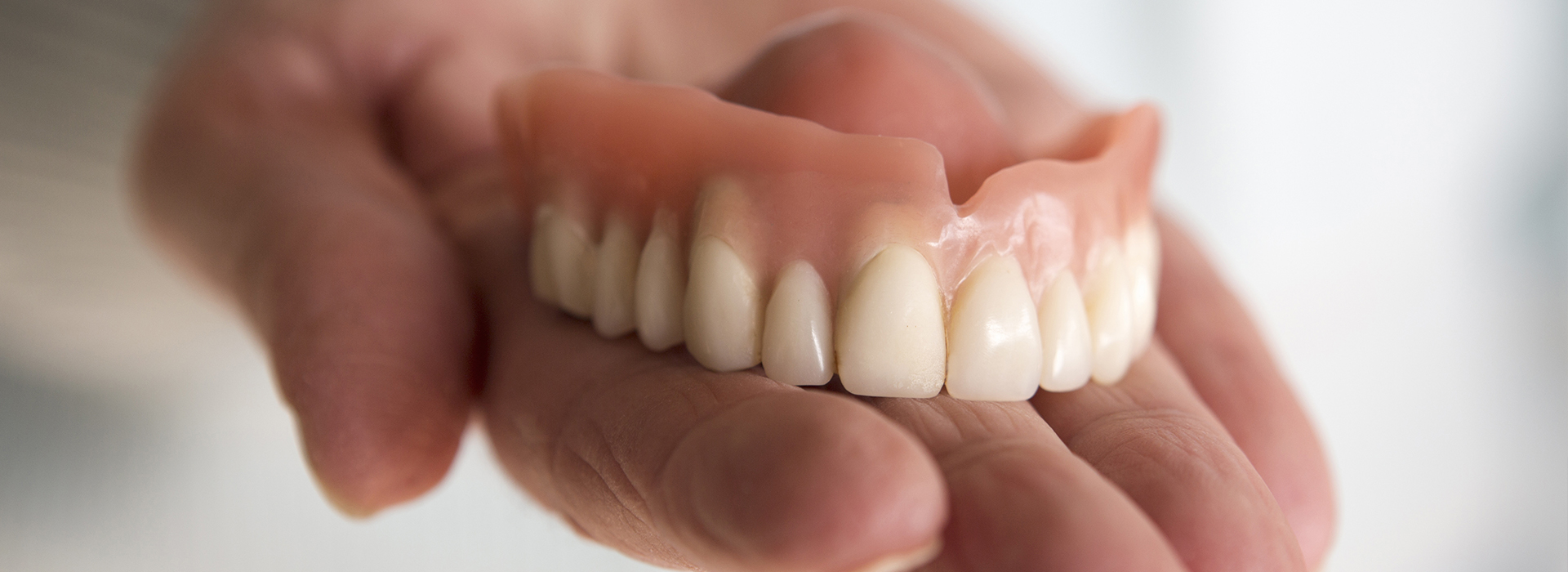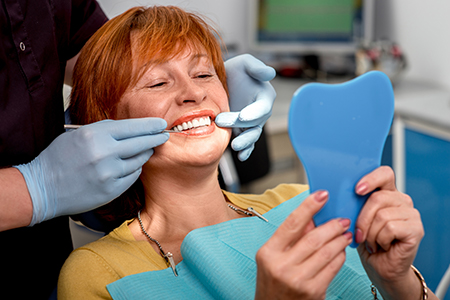
Advances in dental materials and laboratory techniques have made replacing missing teeth more predictable and natural-looking than ever. While fixed options such as dental implants and bridgework restore function for many people, removable dentures remain a widely used, reliable solution for recreating a complete smile and restoring everyday abilities like eating and speaking.
At the office of Callahan Family Dentistry, we design dentures using quality materials and careful attention to fit and facial balance. Our goal is to create prosthetics that not only restore the appearance of teeth but also support the cheeks and lips so facial contours look natural and healthy.
We focus on individualized care: evaluating your oral health, listening to your priorities, and recommending denture designs that meet functional needs while being comfortable to wear. Whether you are considering dentures for the first time or replacing an older prosthesis, our team will guide you through each step.
Tooth loss affects more than appearance. Missing teeth change how the jaws work together, can make chewing inefficient, and sometimes limit the types of foods a person can comfortably eat. Restoring teeth helps re-establish a functional bite and improves your ability to bite and chew with confidence.
There are also long-term structural consequences when teeth are absent. Without the stimulation of teeth, the bone that once supported them tends to resorb gradually. Replacing missing teeth with well-fitting dentures helps preserve facial support and reduces the visible changes in jaw and cheek contours that can occur over time.
Losing teeth can affect speech clarity and social interactions; having a secure prosthesis helps patients speak freely and engage with others without worrying about gaps or slippage. Properly designed dentures also protect remaining teeth by preventing undesired drifting and by distributing biting forces more evenly across the mouth.
Although timing varies by individual circumstances, addressing tooth loss sooner rather than later typically leads to better long-term comfort, function, and appearance. Our practice evaluates each case carefully to recommend the most appropriate timeline and prosthetic approach.

Dentures are removable appliances made of artificial teeth set in a supportive base that rests against the gums. The base is shaped and colored to mimic the natural gum tissues, and the teeth are selected for size, shape, and shade to complement a patient’s facial features and bite.
Because dentures are removable, they can be taken out for cleaning and for giving the oral tissues a break overnight. This removability also allows for easier hygiene of both the prosthesis and any remaining natural teeth, which is an important aspect of long-term oral health.
Modern denture fabrication involves precise impressions, careful bite records, and multiple try-in appointments to verify fit and appearance. The objective is a balance of comfort, function, and aesthetics — a prosthesis that operates well during everyday activities and looks appropriate in relation to the face and smile.
When natural teeth are present, a partial denture can fill one or several gaps while helping to stabilize the bite. When all teeth in an arch are missing, a complete denture replaces the full row of teeth and restores the look and function of the smile.
Choosing a denture type depends on how many teeth remain, the condition of the gums and bone, and a patient’s preferences for function and maintenance. A thoughtful evaluation looks at oral health, jaw relationships, and daily habits to determine which prosthesis will provide the best outcome.
Partial dentures are designed to replace several missing teeth while using existing teeth for support with clasps or precision attachments. They look to preserve remaining teeth and prevent unwanted movement. Full, or complete, dentures replace all teeth in an arch and rely on tissue contact and suction for retention, especially in the upper jaw.
For patients seeking increased stability, options exist that combine removable dentures with fixed supports. Overdentures attach to remaining tooth roots or to dental implants and provide improved retention and comfort. Implant-supported dentures connect to strategically placed implants to reduce movement and improve chewing performance.
Deciding among these choices involves weighing factors such as oral anatomy, long-term oral health goals, and desired levels of stability. Our clinicians will explain the pros and cons of each approach and recommend a plan tailored to your situation.
Complete dentures replace an entire arch and require careful planning for proper support and bite alignment. In some cases, a conventional complete denture is created after natural teeth are removed and the tissues have healed, when a precise, stable fit is easier to achieve.
Immediate dentures are inserted on the same day teeth are removed so patients do not be without teeth during the healing period. While this approach maintains appearance and function right away, tissue changes during healing can affect fit and may necessitate future adjustments or a reline to restore comfort.
Overdentures for added support
An overdenture gains additional retention by using remaining tooth roots or special attachments. Preserving roots where feasible can help maintain bone height and improve the overall stability of the prosthesis.
Implant-supported denture options
Small surgical implants placed in the jaw provide secure anchor points that a removable denture can snap onto or be supported by. This solution noticeably reduces movement compared with traditional tissue-supported dentures and often improves function for chewing and speaking.
Partial dentures fill the spaces left by missing teeth, using the remaining dentition for support. They come in a variety of frameworks, from traditional cast metal to flexible resin designs, each offering different trade-offs in terms of strength, comfort, and aesthetics.
In addition to restoring the appearance of the smile, partials help stabilize adjacent teeth and preserve the alignment of the bite. Properly designed partial dentures distribute chewing forces across the mouth and reduce the risk of neighboring teeth moving into vacant spaces.
Material choices and attachment styles are selected based on the number and position of missing teeth, gum and bone health, and patient preferences. Our team will explain the options and select a design that balances durability, hygiene, and comfort.
Throughout the design process, emphasis is placed on achieving a prosthesis that fits well, supports healthy function, and integrates seamlessly with the rest of the mouth.

A successful denture outcome depends on precise planning and a clear sequence of steps. That includes reviewing medical and dental history, taking detailed impressions, and using diagnostic tools to plan tooth position, bite relationships, and the final appearance of the smile.
Some patients require preliminary treatments before denture fabrication, such as extractions of nonrestorable teeth or minor tissue reshaping to create a stable base. Addressing these needs beforehand helps ensure the denture seats properly and remains comfortable over time.
We combine clinical experience with modern laboratory processes to guide each stage: impression taking, try-ins, shade and tooth selection, and final adjustments. This integrated approach minimizes surprises and produces prosthetics that work well in daily life.
When implants are part of the plan, coordination between surgical placement and prosthetic steps is essential. Our clinicians work with patients to outline the sequence and set expectations so the final denture meets functional and aesthetic goals.

Getting accustomed to a new denture typically involves a short period of adaptation. It is common to experience increased salivation, minor speech changes, and the need for a few adjustment visits. Regular follow-up allows the clinician to smooth pressure points and fine-tune the fit.
Begin eating with softer foods and cut items into smaller pieces while you regain chewing confidence. Avoid relying on one side of the mouth and take small bites; over time you will develop a comfortable chewing pattern with the new prosthesis.
Daily cleaning of the denture and careful hygiene of the gums and any remaining teeth protect oral tissues and extend the life of the appliance. Remove the denture at night to let the tissues rest and to reduce the risk of irritation.
Periodic checkups are important to monitor fit and oral health. As the supportive tissues change over the years, relines or adjustments may be needed to restore stability. If an attachment system or implants are used, those components require their own maintenance schedule.
Our practice is committed to helping patients achieve comfortable, functional results. If you would like to learn more about denture options, care, or which approach is best for your situation, please contact us for more information.
Today, it’s easier than ever to replace missing teeth and achieve natural-looking, durable, and long-lasting results! Depending on a patient’s dental needs, lifestyle, expectations of care, and budget, choices can include conventional fixed bridgework, dental implants, or removable partial and complete dentures. At the office of Callahan Family Dentistry, we’ll discuss all your options in care and answer all your questions as you choose the solution that’s right for you.
With advances in dental materials and technology, today’s dentures are more comfortable and realistic-looking than ever before.
Whether you wear partial or complete dentures, it’s essential to see the dentist for routine care. Besides checking the fit and condition of your dentures and making any necessary adjustments, you’ll also receive a comprehensive exam to check on the health of any remaining teeth as well as the soft and hard tissues in and around the oral cavity.
A same-day denture offers an accelerated design and fabrication process that allows a patient to go from impression taking to denture insertion in a single day.
For patients who don’t want to wait after having teeth extracted, an immediate denture can be inserted the same day your teeth are removed. Sometime later you may need the denture relined to address any changes in its fit once the extraction sites have completely healed.
While no one wants to drop or break a partial or complete denture, accidents do happen. The good news is that in some cases, your partial or complete denture is reparable. It all depends on the extent of the damage. Don’t hesitate to contact our office if you’ve broken or damaged your denture. We’re happy to help.
The simple act of taking your partial denture in and out can cause certain types of metal clasps to loosen over time. When you come in for your checkup visit or contact our office for an adjustment, we’ll assess the fit of your partial and tighten the clasps for improved stability and comfort.
While rebuilding a complete smile is a worthwhile investment, our office is sensitive to the costs involved in dental care. We customize care and will discuss which treatment options address your needs, lifestyle, and budget. How much a new denture will cost depends on the type of the prosthesis, its design, and the materials used to fabricate the supportive base, teeth, and clasps or precision attachments. Dentures that include the placement of dental implants for added retention and stability typically involve additional costs.
If you have dental insurance, your coverage may include a new or replacement set of dentures. Our staff is happy to review your coverage with you to ensure you are maximizing your insurance benefits while minimizing any out of pocket expenses.
At the office of Callahan Family Dentistry, we provide an extensive range of dental services, including the latest and most effective methods to help patients with missing teeth rebuild complete and beautiful smiles. As skilled and experienced professionals, we recognize that every patient is different, and every smile is unique. We’re passionate about what we do and take great pride in providing personalized treatment plans while treating our patients as valued partners in care.
Our goal is to help every patient experience the benefits of good oral health and a beautiful smile. We value the trust you have placed in our office and strive to provide solutions that meet your dental needs and expectations of care.
